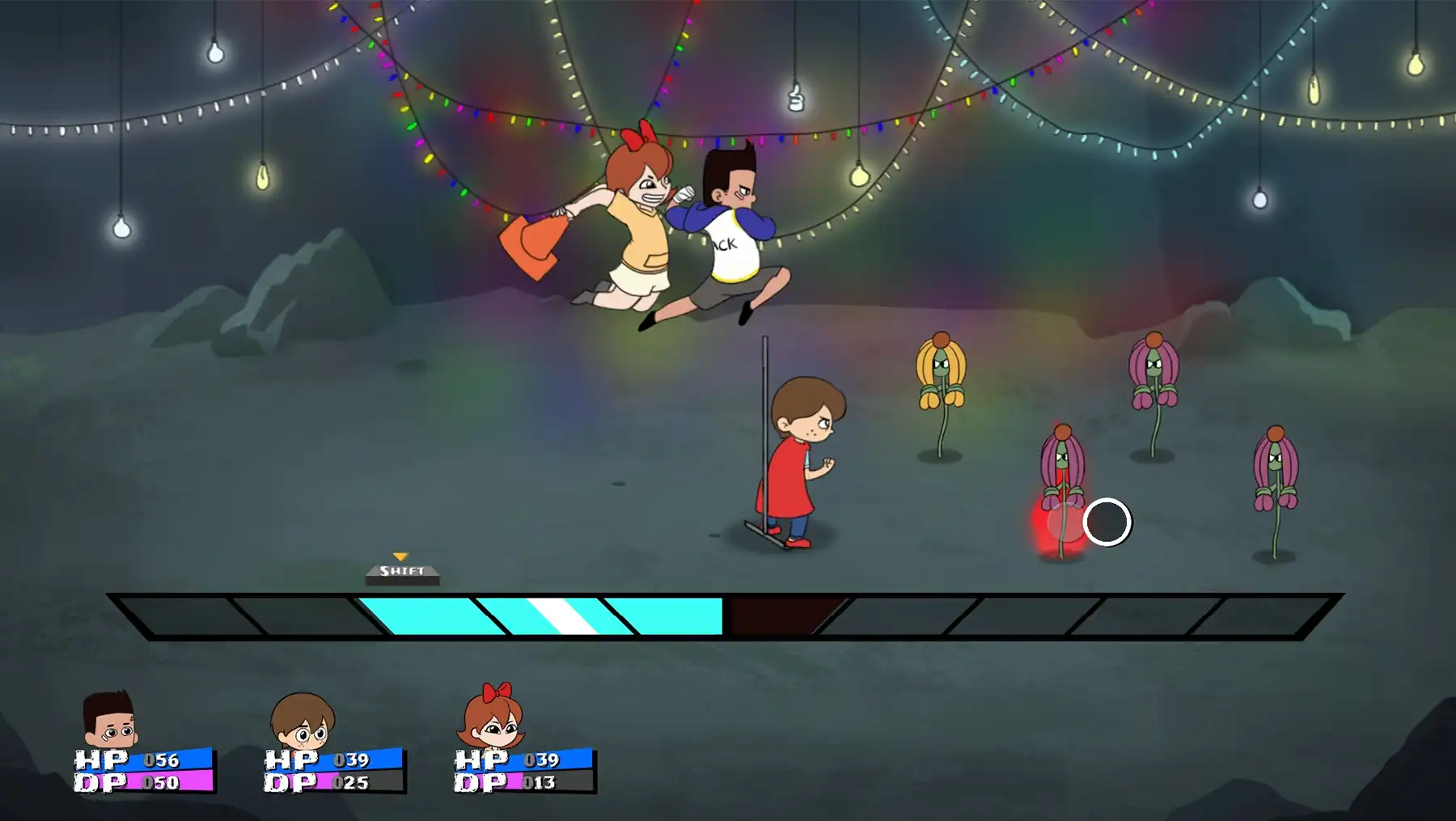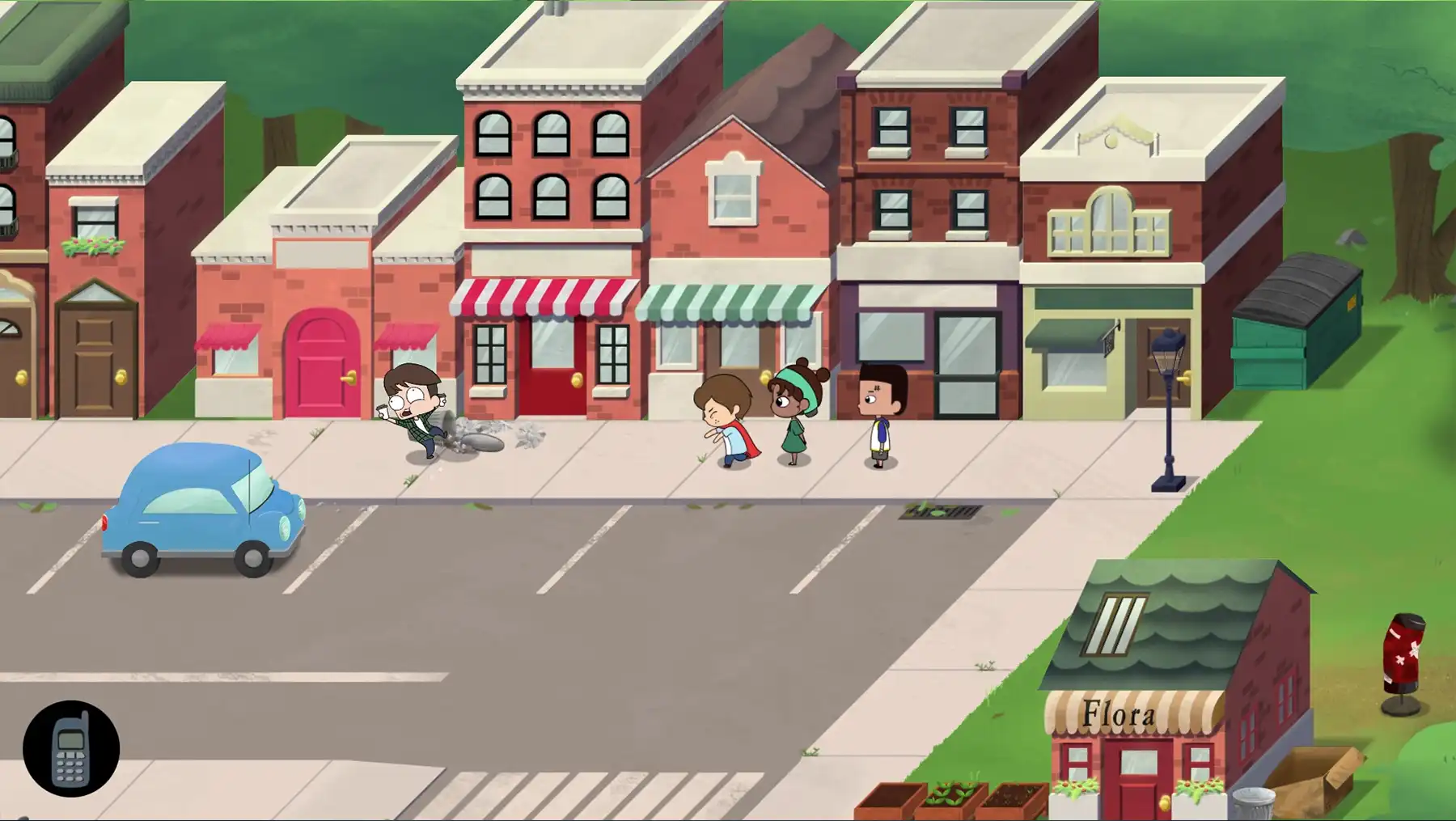Jimmy Spencer came to DigiPen’s BS in Computer Science in Real-Time Interactive Simulation program in 2008 with a notion that, one day, he might like to go his own way. “I had this whole idea of starting my own game studio with the knowledge I’d get there,” Spencer says. “It was always in the back of my mind as something I wanted to do, and over time, I guess I ended up following through on that!” On September 19, Spencer’s own Studio Kumiho released its second, most ambitious title to date, Cricket: Jae’s Really Peculiar Game, out now on PC and all major consoles. Spencer’s original Japanese-style role-playing game (JRPG) was developed by a core team of nine people, five of whom are DigiPen alumni as well.
Cricket: Jae’s Really Peculiar Game was born from Spencer’s passion for JRPGs — alluded to in the game’s abbreviated title, Cricket: JRPG. “I just love JRPGs. They’re my favorite genre, and I had wanted to make one for a long time,” Spencer says. Shortly after his 2012 DigiPen graduation, Spencer began building the first version of the custom engine Cricket would eventually run on, developing the project on the side while working jobs at Fugazo Games, Amazon, and Nerd Ninjas. Before he could utilize it for Cricket, however, he got a surprise proposition to use it elsewhere first.

Fellow DigiPen alum Dean Hulse, a 2018 BS in Computer Science and Game Design graduate, heard about Spencer’s custom engine and his dreams of starting an indie studio. “He came to me with a game idea and asked, ‘Why don’t we use your engine to make this?’” Spencer says. The concept, an arena-style multiplayer game about manipulating zombies with sound to devour opponents, eventually turned into A Sound Plan for PC and Nintendo Switch. The 2019 title became Spencer’s first indie game published as Studio Kumiho, his new upstart indie named after a fox-like creature from Korean folklore — a choice he made to honor both his own Korean heritage and his dog. “My dog is a Shiba Inu. He looks like a fox,” Spencer laughs. “I saw him and thought, ‘He’s kind of like a kumiho!’ Since it also rhymed with ‘studio,’ I thought it worked well.”
Suddenly in charge of his own studio with a new game to promote, Spencer says he learned a lot of lessons all at once. “I had to be the biz dev, producer, and only engineer on the project while also doing all the marketing,” Spencer says. “I learned you should market early and market often, and make sure to find your audience and go where they are.” Spencer and Hulse, both members of the Pacific Northwest fighting game community, toured playtests and demos of A Sound Plan around at local tournaments, as well as conventions like the Portland Retro Gaming Expo and PAX West’s Indie Megabooth. Spencer took all the lessons learned from both the technical, engine-side of developing A Sound Plan, along with the business side of promoting it, and rolled those experiences into Cricket: Jae’s Really Peculiar Game.
The JRPG’s whimsical story follows the titular Jae, a young boy who goes on a journey to the moon with his friends in an effort to bring his mother back to life after her tragic passing. “I’d always had this story in mind that had been percolating for a long time,” Spencer says. “I wanted to write about loss, loneliness, and friendship, because those are three pillars in my life I’ve also experienced that I thought I could tell a good story about.”
The game was originally a high fantasy tale in the style of classic JRPGs like Dragon Quest, but over time, Spencer realized that the surreal, domestic setting of Super Nintendo classic Earthbound and the larger Mother JRPG series better fit the tone of the story he wanted to tell. Traveling from town to town, players battle militant flowers, shark gangsters, aggressive squirrels, and more during their quest to the moon. “We used Earthbound as an aesthetic reference but tried to modernize it to make it look like a Saturday morning cartoon,” Spencer says of the game’s distinct, hand-animated visuals.

Spencer drew inspiration from Chrono Trigger and Octopath Traveler for the game’s battle system, which utilizes timing-based combat, special team attacks, and a “tide” bar that can increase damage or slow down time to make blocking easier. Beyond the game’s enemies, players can also antagonize pretty much anyone in the game, part of Cricket’s unique built-in notoriety system. “We wanted to create a more interactive JRPG overworld, so when you’re sprinting around, you can bump your head into things and they’ll react to you,” Spencer says. “You can also pick up objects and throw them and hit people and make them angry.” Acting as a sliding difficulty adjuster, the more mischief you make, the harder enemies are to defeat, which also yields more experience.

Cricket began as what Spencer calls “a little project with a little engine,” but as time went on, it grew into something much bigger. “Friends would join the project, leave the project, and at some point, it came about that I had to hire people. We just needed dedicated staff,” Spencer says. Along with Hulse, Spencer enlisted the help of four other DigiPen alumni in the area (Kiri Schwedler, Ari Trejo, Mika Trejo, and Ethan Yu) who joined in to finish the project on what grew to become a nine-person Studio Kumiho development effort. “The team is absolutely wonderful,” Spencer says.
That cooperative, community building aspect of game development at DigiPen, I wouldn’t trade that for the world.
While acting as the head of a studio can be a lot of responsibility at times, Spencer says he’s leaned on his team a lot through the process. “You have to wear a lot of hats and make a lot of stressful decisions running a studio, but I’ve learned so much getting to work with all these incredible people,” Spencer says. “Being independent and getting to work with your friends on what you want is a great feeling.”
Spencer says DigiPen prepared him for the industry “very effectively” when it comes to the hard skills required of game development, but looking back, one of his biggest takeaways was simply the community he made through school. Now leading Studio Kumiho, it’s the same community he tapped to help push Cricket to the finish line. “That cooperative, community building aspect of game development at DigiPen, I wouldn’t trade that for the world,” Spencer says. “It harkens back to the Cricket story pillars of loss, loneliness, and friendship. Friends are people who will help you through anything, and the friends I made at DigiPen are definitely that.”
